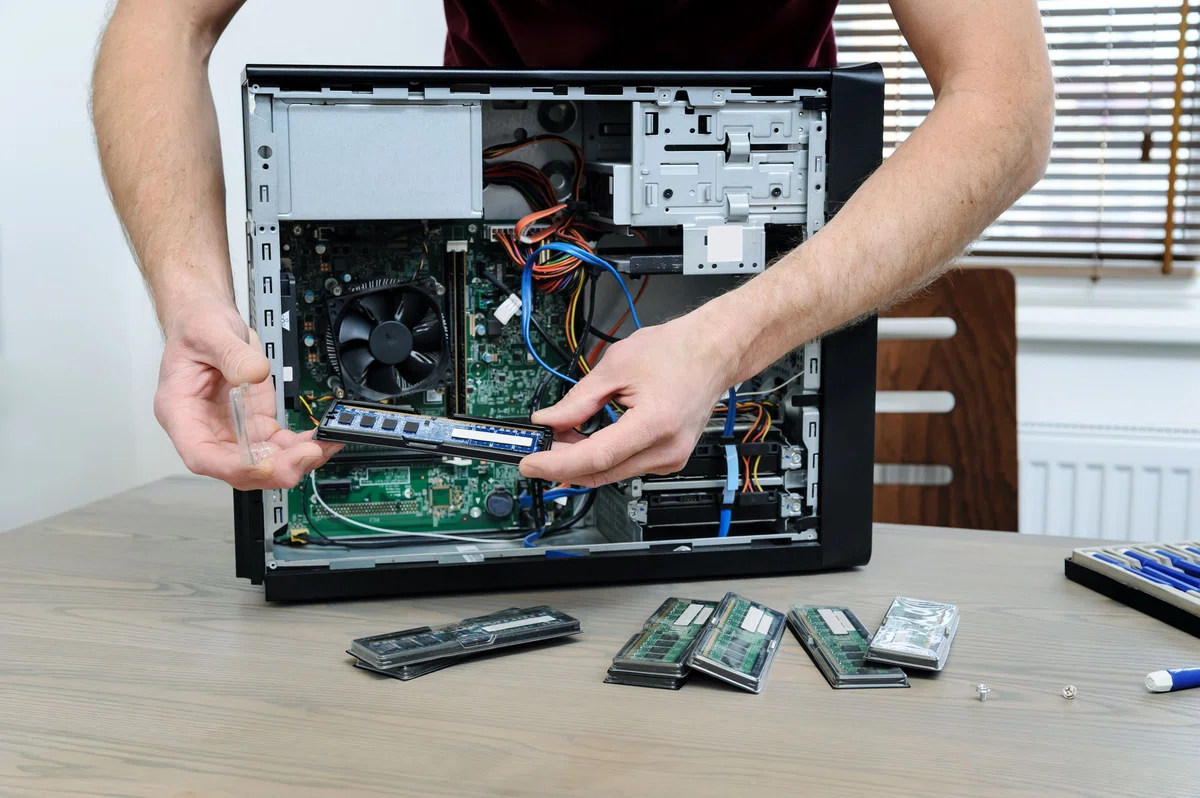
How to choose a master for computer repair
Guide to choosing a master for computer repair. How do you choose a technician to repair your computer? What information should you check with a technician before repairing your computer?
The content⬇️
- Finding reliable information about a handyman in an online environment
- Employment history
- Guarantees
- Reviews
- The cost of services
- How to properly discuss the problem before calling a technician or contacting a service center
- Working unofficially
- Providing a "diagnosis" over the phone
- Lack of clarification and instantly assign a fixed cost for repair
- Offers free diagnostics
- How to Identify a Reliable Specialist
- Evaluation of a Field Handyman
- Diagnostics in the office
- Frequent Questions:
- What is important to consider when choosing a handyman for computer repair?
- How can I check the master's reputation?
- What kind of experience should the wizard have?
- What qualifications must the master have?
- Should I turn only to professional craftsmen?
- Is it possible to choose a craftsman on the basis of a low price?
- Does the warranty for the work performed have to be taken into account?
- How do I know if a craftsman is certified?
- Should I go to a mechanic who has experience with a certain model of computer?
- What information should I ask my technician for before repairing my computer?
- Finding a trustworthy technician
Sometimes technology fails at the most unexpected moments, and yet it is now the main tool of earning for many. To avoid being caught off guard by this situation, we will tell you what to pay attention to when searching for a computer repair technician.
Finding reliable information about a handyman in an online environment
Before deciding on a handyman for computer repair, it is advisable to actively search for information about the handyman online. Most experts post their information on free bulletin boards, create their own websites or profiles on social networks.
In doing so, you should pay special attention to the following aspects:
1. Employment history.
Professionals usually indicate how long they have worked in the field and what they specialize in. If this information is missing, most likely the craftsman has only recently started his activities and is still gaining experience.
2. Warranties.
Having a warranty will allow you to avoid additional costs if the computer fails again soon after repair. If the master does not provide a guarantee, it is worth to refrain from turning to him, despite the possibly attractive price.
3. Reviews.
They can be searched not only in social networks, but also on maps. At the same time, you should be wary of too negative or overly positive reviews, as some of them may be biased. The ideal is to have a variety of reviews, as well as active interaction of the master with the criticism without showing offensive behavior.
4. Cost of services.
If all prices are listed as contractual, or if the cost of work seems extremely low, you should think twice before choosing such a computer wizard. It is possible that after the repair work, the price will increase significantly.
Tip: If you have difficulties with computer repair and you are not confident in your skills, it is better to turn to professionals. Specialists with experience and knowledge will be able to effectively solve the problem and offer suitable repair services.
How to properly discuss the problem before calling a handyman or contacting a service center
Before ordering a handyman or dragging your computer to a service center, it is recommended that you first contact a professional and tell them about the problem that has arisen. At times, one phone call is enough to determine if you can trust the professional.
There are a few warning signs to look out for when it comes to a handyman:
1. Works unofficially.
When interacting with the handyman, it is worth clarifying whether he has the status of a self-employed or individual entrepreneur. Specialists working officially, will conclude a contract, provide an act of work performed and a receipt of payment. In the case of dissatisfaction with the quality of services, on the basis of these documents you can demand a refund.
2. Providing a "diagnosis" over the phone.
If you report that you have problems with computer freezing, and the master immediately offers you cleaning from viruses, most likely, you are dealing with a non-professional. An experienced technician knows that the causes of computer freezes can be varied, and the first thing you need to do is to make a diagnosis.
3. The lack of clarification and instantly assigning a fixed repair cost.
This is a typical method of scammers, who significantly increase the price after the repair. A decent technician will provide a preliminary estimate of the cost, and the exact price will tell after diagnosis.
4. Offering free diagnostics.
This practice is the norm at official service centers of some manufacturers, but in the case of a private master should be more vigilant. Many craftsmen do not charge only for the diagnostic service, if you leave the computer for repair. If you refuse to repair, you will have to pay, since the master has already spent time and effort to do the work.
How to determine a reliable specialist
Evaluating a field technician
When inviting a field technician, it is worth paying attention to the tools he brought with him. A competent craftsman is always ready for any situation and has spare tools and consumables. However, if the master arrives only with a flash drive, asks you to provide a screwdriver to disassemble the laptop and offers to go to the store for thermal paste for the processor, it is probably not a professional.
Diagnosis in the office
Usually the computer diagnostics does not take much time, so you can ask the master to perform it in your presence and describe in detail what exactly is broken and what type of repair is required. However, if the master offers you to replace part of the parts just in case, most likely, he is trying to impose on you unnecessary services.
Frequent questions:
1. What is important to consider when choosing a master for computer repair?
Experience, reputation, qualifications.
2. How can you check the reputation of the master?
Customer reviews, recommendations of friends, online ratings.
3. What kind of experience should the master have?
Preferably, a master with experience in computer repair.
4. What qualifications should the master have?
The master must have the knowledge and skills necessary to repair the computer.
5. Should I go only to professional craftsmen?
Yes, it is recommended to go to professionals to ensure quality repairs.
6. Can I choose a craftsman based on low price?
A low price does not always guarantee quality work, so you should pay attention to the experience and reputation of the master.
7. Should you take into account the warranty on the performed work?
Yes, the warranty may be an important factor when choosing a wizard.
8. How do you know whether the master is certified?
You can ask the craftsman about his certifications or search for information about him in online resources.
9. Should I go to a wizard who has experience with a specific computer model?
It is desirable that the technician has experience with a particular model of computer to ensure more accurate and faster repairs.
10. What information should I check with the technician before the repair?
Prices for services, repair deadlines, possible causes of malfunction and ways to fix it.
Finding a reliable technician
If you do not know who you can trust to repair your computer, it is recommended to turn to specialized services. For example, on Uslugi.ge, every craftsman registered on the platform undergoes document verification, and reviews are carefully moderated to prevent falsification.







29 comments
Log in to leave a comment
1. Experience: Look for a technician with a proven track record and considerable experience in computer repairs. An experienced professional is more likely to have encountered a wide range of issues and can provide effective solutions.
2. Expertise: Determine the technician's expertise by checking their certifications, training, or specialization. Look for professionals who are knowledgeable in the specific type of computer or operating system you need assistance with.
3. Reviews and Recommendations: Read customer reviews and seek recommendations from friends, family, or online communities. Honest feedback can provide valuable insights into a technician's skills, professionalism, and customer service.
4. Warranty and Guarantee: Inquire about the warranty or guarantee offered for the repairs. A reliable technician should stand behind their work and offer some form of assurance that the issue will be resolved.
5. Timeliness and Communication: Choose a technician who communicates promptly and clearly. They should be responsive to your inquiries and provide regular updates throughout the repair process. Timeliness is crucial, especially if you rely heavily on your computer for work or personal tasks.
6. Cost and Transparency: Discuss the cost of the repair upfront and ensure transparency regarding any additional charges. Compare prices from different technicians to avoid overpaying or falling victim to hidden fees.
7. Location and Accessibility: Consider the technician's location and accessibility. It's generally more convenient to choose someone nearby, as it reduces transportation time and allows for quick assistance during emergencies.
Remember, investing time and effort in selecting the right computer repair technician can save you from unnecessary hassles and ensure that your computer is in capable hands.